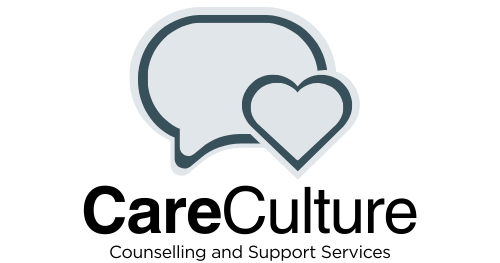Terms and Consent for Service
Before receiving any services (counselling), it is required to receive your informed consent . By reviewing and agreeing to the information presented below, you will be informed about Care Culture Counselling and Support Services counselling process, personal information handling, client record management, electronic communication policy, financial agreement, and the risks/benefits of online counselling. Informed consent for counselling services is critical for client self determination.
Consent must be given voluntarily and knowingly. At any time, you have the right to withdraw consent to services.
What to expect
Counselling is a collaborative process in which the client and service provider work together to support the improvement of well-being and functioning. During the first session, the client will discuss the current concerns that have brought you to seek services. Together, you will explore appropriate next steps, which can include (but not limited to) goal setting, increased awareness, development of strategies, and improvement of interpersonal skills. The frequency and number of sessions will vary depending on the type and amount of issues brought to counselling and will be discussed and agreed upon together. While several topics and actions may be discussed in session, the overall outcome of counselling will be influenced by the client’s actions and external factors outside of the influence of counselling.
As per the Ontario College of Social work and Social Service Workers, “Counselling services are defined as services provided within the context of a professional relationship with the goal of assisting clients in addressing issues in their lives by such activities as helping clients to find solutions and make choices through exploration of options, identification of strengths and needs, locating information and providing resources, and promoting a variety of coping strategies…” (OCSWSSW, 2023).
General Risks
The counselling often results in setting goals and working towards changes within your thoughts or behaviours. As a result, you may experience discomfort, such as recalling unpleasant events, changes within your mood, and/or other unpleasant feelings or thoughts. This is a normal part of the counselling process for many and you are encouraged to share these feelings during our counselling journey.
Virtual/Online Counselling Risks
Counselling is provided through a remote telecommunication technology such as a video meeting platform agreed upon by all parties.
As services are provided remotely, there is a risk to confidentiality as you may be overheard during your session.Risks related to technology can include system failure, privacy breach or compromised data, or software/connection issues.
Care Culture Counselling and Support Services takes all reasonable steps to ensure privacy from their side. It is the responsibility of the client to ensure that you are in a private secure space when engaging in counselling sessions.
Care Culture Counselling and Support Services takes all reasonable steps to ensure the safety of all data and technology. It is the responsibility of the client to ensure that the devices and methods they are utilizing are private and secure.
Client Records and Confidentiality
Your service with Care Culture Counseling and Support Services are confidential and client file materials are the property of and under the protection of Care Culture Counselling and Support Services. Client files contain client contact information and correspondence relevant to treatment, brief session notes, and other pertinent information provided by approved sources. The information therein is used for basic client record keeping and to inform ongoing treatment recommendations. Client files are maintained in a physical and/or electronic database which meets the confidentiality standards of the College of Social Workers and Social Service Workers (OCSWSSW) and the Personal Health Information Protection Act, 2004 (PHIPA). Records are kept for a minimum of seven years for adults and ten years for children.
No personal information about the client or their use of counselling will be released without written consent except in the following situations:
1. When the records of a client have been subpoenaed by a court of law
2. When a person is deemed to be in danger to themselves or others
3. When a medical emergency occurs while in counselling
4. When it has been deemed that a child is being abused, neglected or abandoned or at risk of being abused, neglected or abandoned.
Please note, the recording of in-person or video sessions is not permitted.
Service Fees
Counselling appointments are 50 minutes in length and payment of $120 is expected on the date of the appointment by bank e-transfer.
Sessions that are scheduled but not attended or are cancelled without 24 hours notice will be billed at 50% of the session fee.
If you are offered a sliding scale rate, the amount will be discussed and agreed upon by all parties and confirmed in writing prior to your appointment.
Communication and Crisis Services
Care Culture Counselling and Support Services does not provide 24 hour a day crisis service. While emails and phone messages are checked regularly, an immediate response is not always possible. If you are experiencing an emergency crisis situation, please call your local mental health crisis line, 911, or go to your nearest emergency room.
Care Culture Counselling and Support Services does not communicate through text messaging, social media, or methods other than email or phone.
Care Culture Counselling and Support Services does not provide:
1. Letters regarding current or subsequent legal situations
2. Verbal or written confirmation of “fitness to return to work or school”
3. A formal diagnosis of any problem presented in counselling.
A document outlining the above will be shared with clients prior to receiving services. The document must be understood and signed in order to receive services.
We acknowledge that spaces we live, work, and grow are the territories and lands traditionally stewarded and cared for by the Mi’kmaq, Neutral, Wendat, Haudenosaunee, Anishinabeg, Mississaugas of the Credit and Attiwonderonk. Reconciliation with First Nations, Inuit, and Métis people is a collective responsibility. We are all treaty people.
To learn about where you are situated, visit https://native-land.ca/ and https://www.whose.land/en/




